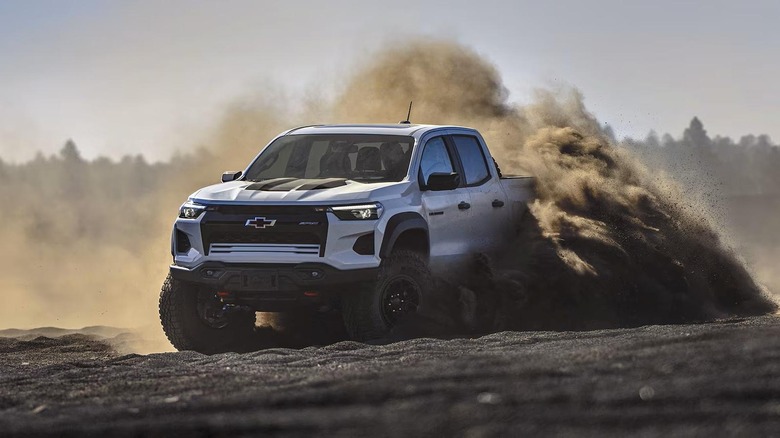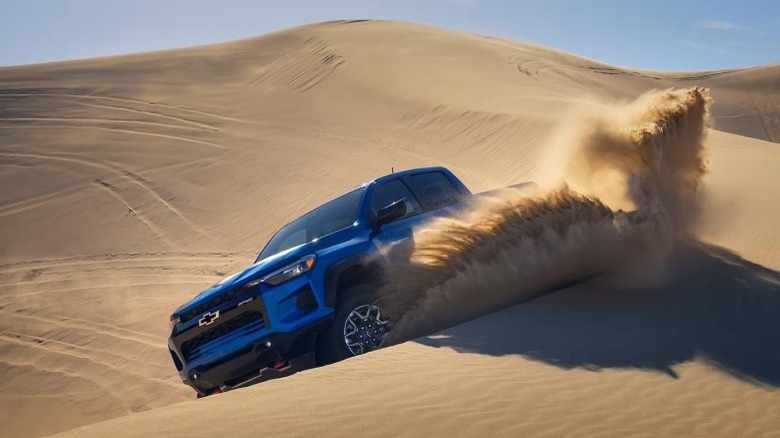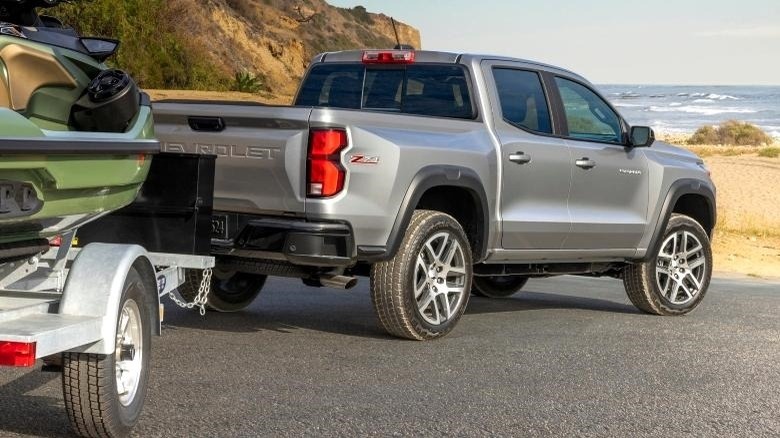What's The Difference Between The Chevrolet Colorado ZR2 Vs. Z71?
When you begin searching for a new pickup truck, you'll quickly realize each available model gives you a plethora of options to pick from. In the case of the midsize 2024 Chevy Colorado, you can select from a list of up to five trim levels, which includes the WT, LT, Trail Boss, Z71, and ZR2.
Now, if your goal is to get an adventure-ready machine for your off-road driving needs, your choices narrow down to the Trail Boss, Z71, and ZR2. Much like the range in models, these Chevrolet trucks vary in their ability to tackle rough terrain, even though all three models are genuinely capable off-roaders that have been thoughtfully designed to play in the dirt.
Compared to the Z71, the Trail Boss is an off-road version of the WT trim and has a 2-inch factory lift, making it taller. Naturally, this also means the Trail Boss is essentially a work-oriented model and a less aggressive version of the ZR2. The Z71, for its part, is an off-road version of the LT trim, and is available with many luxury goodies that the Trail Boss isn't eligible for, like heated front seats. So, if your off-road truck selection process ultimately comes down to extreme performance and luxury, you'll be left with the Z71 and ZR2 as final contenders. And with that in mind, here's how the two compare.
The ZR2 is the most hard-core 2025 Chevy Colorado model
As a specialized hardcore off-road truck, the Chevy Colorado ZR2 has a 3-inch factory lift with Multimatic DSSV dampers that help provide a ground clearance of 10.7 inches, with an approach angle of 38.6 degrees and a departure angle of 25.2 degrees. These allow it to perform well over a wide range of difficult off-road driving conditions, such as rock crawling, while reducing the potential for underbody damage.
Throw in the burly Chevrolet Colorado ZR2 Bison package, and you get an even more elevated ride height, which reaches 12.2 inches of ground clearance, with a 38.2-degree approach angle and a 26-degree departure angle. By comparison, the Z71 includes a lowered suspension with twin-tube off-road-tuned shocks, and as a result, offers a lower ground clearance of 8.9 inches, with an approach angle of 29.1 degrees and a departure angle of 22.3 degrees.
In terms of the wheel and tire combo, the coveted Chevy Colorado ZR2 has 17-inch wheels shod with big 33-inch mud-terrain tires that give the desired grip no matter the off-road course, while the Bison gets 35-inch versions of the same Goodyear territory mud-terrain tires. The Z71, meanwhile, muddles through with 18-inch wheels paired with still-good all-terrain tires.
Whether you opt for the Z71 or any of the ZR2 models, you can expect to find many drive modes that are designed to help you maneuver out of harm's way. The ZR2 offers a four-wheel-drive system with electronic locking front and rear differentials, as well as five drive modes. These include Normal, Tow-haul, Off-road, Terrain, and Baja modes. The Z71 supplies four drive modes (Normal, Tow-haul, Off-road, and Terrain) and a G80 automatic locking rear differential.
The Chevrolet Colorado Z71 can tow more and is more fuel efficient
The Chevy Colorado ZR2 may have a performance advantage when it comes to tackling aggressive grades, but the Z71 pulls ahead when it comes to truck duties like towing. That's despite both trucks sharing the same 310-horsepower 2.7-liter turbocharged four-cylinder engine with 430 lb-ft of torque. While the Z71 can pull up to 7,700 pounds and carry around 1,587 pounds in its truck bed, the ZR2's towing and payload abilities trail behind at a maximum of 6,000 and 1,151 pounds, respectively (the Bison has a 5,500-pound tow rating and 1,050-pound payload capacity).
The Z71 is also the more efficient pickup. It returns 17 mpg in the city, 20 mpg on the highway, and 18 mpg combined. With the ZR2, those numbers drop slightly to 17 mpg in the city, 17 mpg on the highway, and 17 mpg combined (the ZR2 Bison is good for 16 mpg city, 16 mpg highway, and 16 mpg combined).
As well as being the more efficient and capable workhorse, the Z71 strikes a more optimal balance between off-road capability and on-road drivability, despite the ZR2's sophisticated suspension setup. Its smaller tires allow it to drive better on paved surfaces compared to the ZR2's larger rubbers, as smaller tires tend to provide a more comfortable ride.


